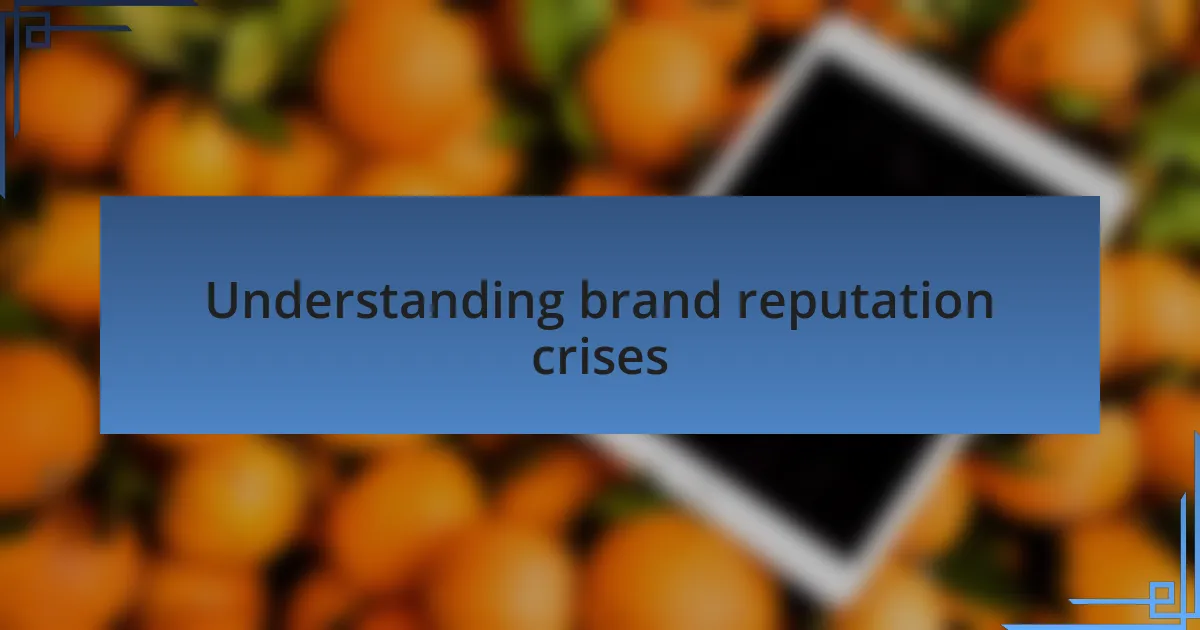Key takeaways:
- Brand reputation crises can arise from unexpected sources, such as social media backlash and negative customer experiences, highlighting the emotional impact on consumer trust.
- Proactive communication and addressing issues head-on can turn potential disasters into opportunities for fostering customer loyalty.
- Consistency in messaging and employee conduct are crucial for maintaining brand integrity and preventing reputation crises.
- Developing a robust crisis management plan and investing in team training are essential strategies for preventing future reputation issues.

Understanding brand reputation crises
Brand reputation crises can arise unexpectedly and often stem from a variety of sources, including negative customer experiences, social media backlash, or even product failures. I recall a time when one negative tweet about a client spiraled into a full-blown public relations nightmare. It left me wondering: how quickly can perceptions change based on a single incident, and what does that mean for a brand’s integrity?
As I navigated these turbulent waters, I realized the importance of understanding the emotional weight that reputation carries. People connect with brands on a personal level, and a crisis can feel like a breach of trust. Have you ever felt let down by a brand you loved? Those feelings can lead to a swift erosion of loyalty, and it’s this emotional connection that amplifies the crisis.
The complexity of managing a brand’s reputation lies in its multifaceted nature. Each crisis is unique, demanding a tailored response that acknowledges not just the facts but the emotional landscape surrounding the issue. For instance, when a brand I was working with faced accusations of poor labor practices, it was crucial to address both the facts and the feelings of concerned customers head-on. How can brands communicate back effectively without sounding defensive or dismissive? This is the balancing act that all digital marketers must master.

Importance of brand reputation
Brand reputation is the foundation upon which trust is built. I once managed a campaign for a small business that thrived on goodwill. After a single poorly handled customer complaint went viral, the damage was immediate. I realized just how fragile that trust can be—it’s a reminder that a brand’s image often hinges on the perception of its actions, not merely the quality of its products.
In my experience, consumer loyalty is rarely about just the transaction; it’s rooted in a deeper emotional connection. I remember an instance where a beloved local café quickly fell from grace after a misunderstanding sparked outrage online. Customers who once championed their community initiatives turned into critics overnight. How do we build that emotional bridge again once it’s been burned? Brands must navigate this intricate terrain with sensitivity and promptness to restore faith in their values.
The repercussions of a tarnished reputation extend far beyond immediate sales. For me, witnessing a well-respected brand’s decline due to negative press highlighted the real cost of reputation. Just a few unhappy voices on social media can sway public perception dramatically, as I saw firsthand. I can’t help but ask: how prepared are you to handle such fallout? Developing a proactive strategy for maintaining your brand’s reputation is not just prudent; it’s essential in today’s fast-paced digital landscape.

Common causes of reputation crises
When I think about the common causes of reputation crises, one glaring example comes to mind: social media missteps. I once worked with a client who posted a promotional meme that was intended to be humorous, but it backfired spectacularly, offending a key demographic. It made me realize that brands must tread carefully on platforms where sarcasm and satire can easily spiral into public relations nightmares. Have you ever seen a brand struggle because of a misjudged joke?
Another critical area to consider is inconsistent messaging. In my experience, when brands project mixed signals about their values or mission, it creates confusion and invites skepticism. I recall advising a company that promised eco-friendly practices yet continued to use non-sustainable materials. Their loyal customers started questioning their authenticity, and it triggered a cascade of negative reviews. This thought leads me to wonder: how critical is consistency in maintaining trust?
Employee behavior is yet another often-overlooked factor influencing brand reputation. I learned this lesson when a colleague’s unprofessional conduct during a public event reflected poorly on our entire agency. It dawned on me that every employee represents the brand, and their actions can have ramifications beyond what we might anticipate. How can we cultivate a culture that prioritizes brand integrity at every level?

Lessons learned from my experience
In navigating brand reputation crises, one of the most crucial lessons I learned was the power of proactive communication. Early in my career, I encountered a situation where a client faced backlash due to a product defect. Rather than waiting for the storm to blow over, I suggested they address the issue head-on with an open apology and a clear plan for resolution. This not only helped to assure customers but also turned a potential disaster into an opportunity for fostering loyalty. Isn’t it fascinating how honesty can sometimes mend what seems irreparably broken?
Another lesson that stood out was the importance of monitoring sentiment. I remember a campaign that generated unexpected pushback due to an external event unrelated to us, but which had somehow become entangled in public discourse. By keeping a finger on the pulse of social media conversations, we were able to pivot our messaging quickly and defuse negativity. It made me ponder: how often do we forget that our audience’s context can dramatically shift their perception of our brand?
Lastly, I realized how imperative it is to learn from every misstep. Every crisis has a silver lining if we’re willing to reflect. After dealing with a particularly challenging backlash, I incorporated regular debriefing sessions within my team. These discussions allowed us to hash out what went wrong and how we could reinforce our strategies moving forward. It begs the question: how can we turn each challenge into a stepping stone for future success?

Strategies for future prevention
To prevent future brand reputation crises, I believe in creating a robust crisis management plan. In one instance, during a significant PR crisis, we implemented a structured approach with clear roles and responsibilities. This preemptive strategy allowed my team to act swiftly, minimizing chaos and ensuring a unified message. How often do we forget that preparation can be our best ally in turbulent times?
Another vital strategy I advocate for is investing in regular training for the entire team. I once led a workshop focused on brand voice and crisis communication. After that session, I noticed an incredible shift in how everyone approached potential issues. It’s empowering to know that informed team members can act as brand ambassadors even in challenging situations. Doesn’t it make sense that a well-prepared team sees more success in preserving brand integrity?
Lastly, building strong relationships with influencers and industry leaders can serve as a safety net during times of crisis. I remember collaborating with a well-regarded figure in our niche after a damaging rumor circulated. Their endorsement helped reaffirm our brand’s credibility and provided reassurance to our audience. Isn’t it comforting to know that strong alliances can bolster your brand when the unexpected occurs?